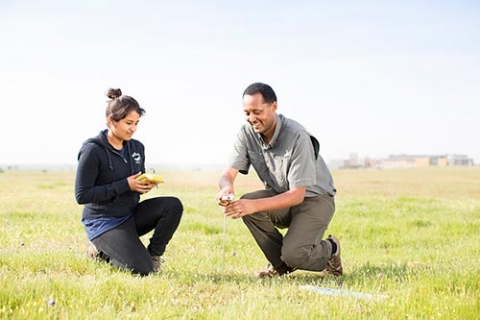Attention Prospective Applicants
Connect with UC Merced's Environmental Systems faculty and learn about graduate study opportunities during this 1-hour webinar and Q&A. This will provide an opportunity for potential applicants to learn more about the campus, the department, and the Ph.D. program. The meetings will be held on the Zoom platform, and we will contact you with sign on information shortly before the event.
11/7, 2 p.m.: Register online
Environmental Systems faculty members are affiliated with the schools of Engineering, Natural Sciences, and Social Sciences, Humanities and Arts. A diverse group, our faculty members, graduate students and research scholars share interests in trans-disciplinary research of natural and human-impacted environmental systems involving:
environmental systems involving:
-
water resources and climate
-
ecology, ecosystems and biodiversity
-
sustainable energy
-
conservation and resource management
-
biogeochemistry and environmental chemistry
-
environmental and ecological engineering
Degree programs integrate scientific principles underlying the function and sustainability of natural and engineered environmental systems, as well as the policies affecting them.
Contact a faculty member to find out more about areas of research.
View the Environmental Systems digital brochure
Application Deadlines
-
Applicants to Ph.D. and thesis-based M.S. programs should list one or more faculty members they would be interested in having as mentors. Applicants are strongly encouraged to contact these faculty members before submitting their application to ensure that these faculty are recruiting students in a given cycle, and to get their advice on application, fellowships, etc.
-
For fall semester enrollment the final deadline is Jan. 15. However, to be considered for internal fellowships, please apply before Dec. 15.
-
To submit application materials, visit the Graduate Division application page.
Environmental Systems Program Learning Outcomes (PLOs)
The overarching goal of the Environmental Systems program is that its graduates be knowledgeable and professionally competent in one or more areas of environmental systems. The following program learning outcomes are being used to attain this goal:
 Core Knowledge - Graduates will be knowledgeable, skillful and self-directed in the observation and analysis of environmental systems in terms of their capacity to independently identify important research questions, develop experimental plans, analyze data, and formulate conclusions in the context of a doctoral dissertation
Core Knowledge - Graduates will be knowledgeable, skillful and self-directed in the observation and analysis of environmental systems in terms of their capacity to independently identify important research questions, develop experimental plans, analyze data, and formulate conclusions in the context of a doctoral dissertation
Communication Skills - Graduates will be conversant in at least two areas of environmental systems, and be adept at oral, written and visual communication of research results to peers and non-technical decision makers
Ethics, Community, and Life-long Learning - Graduates will understand the importance of research and professional ethics, engagement in the needs of their community and life-long learning
Career Placement and Advancement - Graduates will find suitable career placement and achieve advancement in government agencies, non-government organizations, private industry, and/or academic teaching and research institutions
Degree Requirements
Financial Support
Contact Us
Michael Beman, Environmental Systems Graduate Group Chair, email: mbeman@ucmerced.edu
SoE Graduate Support Staff, email: soe-grstaff@ucmerced.edu
Graduate Division
Admissions: 209-228-4723 or gradadmissions@ucmerced.edu
Funding: 209-228-4405 or gradfunding@ucmerced.edu



